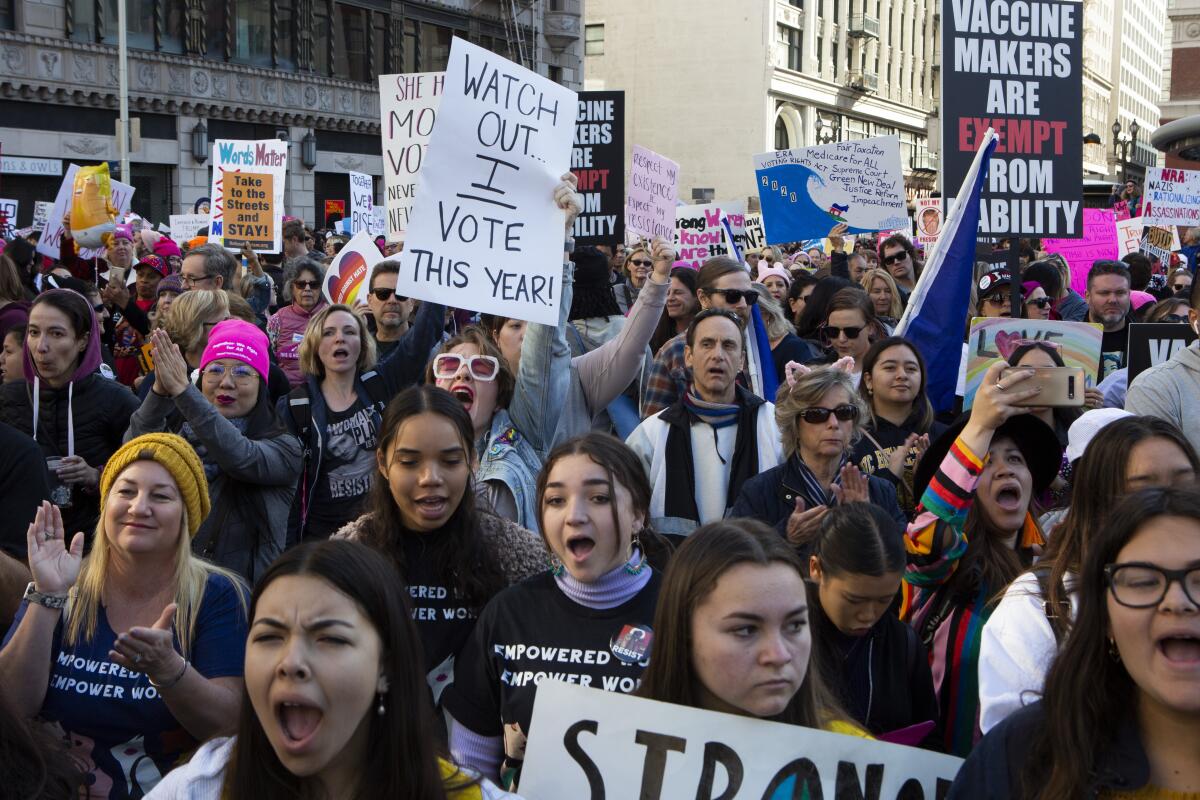California Politics: Huge gains for women in the Legislature

The California Legislature that will be sworn in Monday will include more women than ever before, accounting for about 42% of state lawmakers.
That might not sound like much for a progressive state like California — home to a roster of powerful female politicians who have smashed down barriers in Washington, D.C., including the first woman vice president, Kamala Harris; first woman House speaker, Nancy Pelosi; and the longest-serving woman senator, Dianne Feinstein.
But compared with the paltry representation women have had in Sacramento in recent years, the coming change amounts to a huge jump. Five years ago, just 22% of state lawmakers were women. In 2017, as my former colleagues at CalMatters pointed out, the Legislature included more white men named Jim than Black and Asian American women combined.
Hi, I’m Laurel Rosenhall, the new Sacramento bureau chief for the Los Angeles Times. I started the position this week after spending a year on The Times editorial board and more than 20 years in California journalism. I am very excited to work with an outstanding team of reporters who cover California politics and the state Capitol. And I look forward to hearing from you with ideas and tips.
Bouncing back from disappointment in 2016
As election returns have rolled in over the last few weeks and it’s become clear that women will comprise a sizable portion of the new class of state lawmakers, I’ve been reflecting on election night 2016. I was in Los Angeles reporting on an assemblywoman who had been working to get more women elected to the state Legislature. She was wearing a gray pantsuit in homage to Hillary Clinton, who was widely expected to win office that night as the first female president.
We all know how that turned out.
Instead of writing what I planned — an article saying that Californians sent a bumper crop of women lawmakers to Sacramento the same night Americans elected the country’s first female president — I wrote that Donald Trump won the presidency and the number of women in the Legislature was poised to drop to the lowest level in two decades.
But a lot has happened since then. A surge of feminist activism fueled the Women’s March, the #MeToo movement and, most recently, an electoral backlash against the Supreme Court’s decision to reverse nationwide abortion rights. Clinton’s loss also inspired Democratic women to seek political offices across the country and up and down the ballot.
‘There was a fire’
One of them was Caroline Menjivar, a San Fernando Valley native who in 2016 had just left the Marine Corps to pursue a degree in social work.
“I was involved in all those marches,” she told me. “There was a fire.”
Six years later, Menjivar is about to be sworn in as a state senator representing the San Fernando Valley after winning a tough race that she entered as a clear underdog. Menjivar’s opponent was fellow Democrat Daniel Hertzberg, the son of outgoing Sen. Bob Hertzberg, who represented the region for many years as a senator and an assemblyman. Daniel Hertzberg had valuable name recognition and a huge fundraising advantage.
“Everyone I talked to was like … ‘There’s no way you’re gonna win,’” Menjivar said. “Certain individuals told me to drop out, that there was no point in me continuing.”
And this is where the story of the rising number of women lawmakers becomes less about the cultural zeitgeist and more about the tactical side of politics — factors like redistricting, term limits and candidate recruitment.
Resignations and retirements opened the door
A historic number of resignations and retirements in the Legislature last year created opportunities for women to run for office without the extra hurdle of challenging incumbents, said Susannah Delano, executive director of Close the Gap California, a group that recruits and trains progressive women to run for office. New district boundaries also helped mix up the field in some regions.
“The cultural moment definitely helps,” she said. “But the big step forward we’re seeing this year is most clearly a result of a concerted effort over many years of cultivation and support for women candidates paying off.”
Menjivar was among 10 women the group trained who are heading to Sacramento this year, which amounts to half the women newly elected. In addition to the 30 female incumbents who were reelected, there will probably be 50 women (and as many as 52, depending on the outcome of a couple of close races) among the Legislature’s 120 members.
In the Senate, Aisha Wahab replaces Bob Wieckowski representing the East Bay Area, Angelique Ashby of Sacramento takes the seat of Richard Pan and Marie Alvarado Gil replaces Andreas Borgeas representing the Sierra Nevada region. In the Assembly, Gail Pellerin replaces Mark Stone representing Santa Cruz, Dawn Addis replaces Jordan Cunningham of San Luis Obispo, Diane Papan replaces Kevin Mullin of San Mateo, Liz Ortega replaces Bill Quirk representing the East Bay, Jasmeet Bains replaces Rudy Salas representing Bakersfield, Esmeralda Soria of Fresno replaces Adam Gray, Kate Sanchez replaces Kelly Seyarto in the Inland Empire and Stephanie Nguyen replaces Jim Cooper from Elk Grove.
And all those other guys named Jim? A couple of them still hold office in Sacramento. But most have moved on or termed out.
Enjoying this newsletter? Consider subscribing to the Los Angeles Times
Your support helps us deliver the news that matters most. Become a subscriber.
California politics lightning round
— Under a settlement agreement reached last month, the Pomona Police Department will be required to train its officers on deadly force in compliance with the 2019 legislation that Gov. Gavin Newsom signed amid national protests against deadly police killings of unarmed Black men. Civil rights advocates hope the settlement will finally end the years-long disagreement over the importance of the law and send a warning to police departments around the state that they must comply or face legal repercussions.
— For conservatives running for school boards in California, any dream of a “red wave” proved to be a dud as Republican candidates, including a member of an extremist right-wing group, lost in most races across the state. But even some unsuccessful campaigns garnered enough votes to feed into an already acute sense of political polarization that was once missing from local school board races. And conservative groups feel they’ve found a playbook for winning more.
— Republican state lawmaker Kevin Kiley is headed to Congress after besting Democrat Kermit Jones in the race for an open seat that covered a sprawling expanse of rural California.
— The L.A. Times editorial board says California’s political ethics watchdog needs to start baring some teeth.
— Los Angeles Mayor-elect Karen Bass has invited all staffers in Mayor Eric Garcetti’s office to remain in their jobs through April, according to a letter sent last week — an atypical move intended to steady the ship amid an unusually short transition period.
Stay in touch
Did someone forward you this? Sign up here to get California Politics in your inbox.
Until next time, send your comments, suggestions and news tips to capolitics@latimes.com.
Start your day right
Sign up for Essential California for news, features and recommendations from the L.A. Times and beyond in your inbox six days a week.
You may occasionally receive promotional content from the Los Angeles Times.




